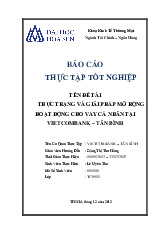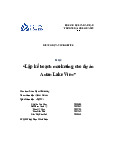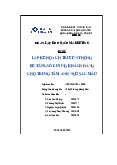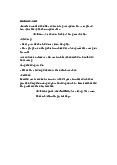



















Preview text:
http://ielts-thudang.com © Verity Cole IELTS Introduction Study Ski I ls·
A self-study course for all Academic Modules - - MACMILLAN EXAMS http://ielts-thudang.com © Macmillan Education
The author and publishers are grateful for permission to
Between Towns Road, Oxford OX4 3PP
reprint the following copyright material:
A division of Macmillan Publishers Limited
Page 23: Material adapted from 'Chats, flirting and travel
Companies and representatives throughout the world
rows - Jumbo is just like us' by Cal Flyn, copyright© News
International Syndication Ltd, first published in The Sunday ISBN 978-0-230-42573-6
Times 05/06/2011, reprinted by permission of the publisher;
Text, design and illustration © Macmillan Publishers
Page 24: Lumir G. Janku for an extract and figure adapted Limited 2012
from Ancient Flying Machines' by Lumir G. Janku, Written by Verity Cole
www.world-mysteries.com, copyright© Lumir G. Janku; First published 2012
Pages 30-31: The Hershey Company for an extract adapted
from "The History of Chocolate" www.allchocolate.com.
All rights reserved; no part of this publication may be
Reproduced with permission of The Hershey Company;
reproduced, stored in a retrieval system, transmitted in any
form, or by any means, electronic, mechanical, photocopying, Page 34: Nick Taylor for an extract adapted from "The Great
recording, or otherwise, without the prior written permission
Depression" by Nick Taylor, New York Times, copyright © of the publishers. Nick Taylor;
Page 36: Jacobs School of Engineering, University of Designed by eMC Design Ltd.
California, San Diego for an extract adapted from "Coming
Illustrated by Oxford Designers & Illustrators Ltd pp 11, 12, 27, to TV screens of the future: A sense of smell", University of 46,47,48,49,65,67,70, 79
California, 15 June 2011, as published on ScienceDaily
Cover photograph by Corbis/Oliver Rossi http:/ /www.sciencedaily.com; •
Picture research by Catherine Dunn I
Pages 45-46: Office for National Statistics for the charts Author's acknowledgements
and table "Percentages of works by home-to-work travel
Many thanks to Macmillan for giving me this opportunity.
time".; "Duration of commute from home to work by region
Thanks above all to Susan Cole, my mum, for all her support
of workplace" and "Median hourly earnings by travel time,
over the years - I could never have achieved what I have
London and Rest of the UK" October-December 2009, without you.
United Kingdom, from Commuting to work, 02/06/2011, www.nomisweb.co.uk , © Crown copyright;
The publishers would like to thank Sam Mccarter.
Page 66: Material adapted from "Telescope to detect ET on his
The authors and publishers would like to thank the following
mobile' by Jonathan Leake, copyright © News International
for permission to reproduce their photographs:
Syndication Ltd, first published in The Sunday Times
Bananastock p31; BrandX p68(tr); Corbis/Bettmann p34,
03/07/2011, reprinted by permission of the publisher;
Corbis/Ocean p24; Getty Images p23, Getty Images/National
Page 68: National Geographic Society for an extract adapted
Geographic p68(b ); Image Source p55; Macmillan Australia
from 'The Real Price of Gold' by Brook Larmer, National p66; Stockbyte pl5.
Geographic, January 2009, http:/ /ngm.nationalgeographic.com,
copyright © National Geographic Society.
Graphs and Tables reproduced with the kind permission of:
These materials may contain links for third party websites.
HESA Student Record-Reproduced by permission of the Higher
We have no control over, and are not responsible for, the
Education Statistics Agency Limited, HESA cannot accept
contents of such third party websites. Please use care when
responsibility for any conclusions or inferences derived from the accessing them.
data by third parties p40; Internet Users-www.internetworldstats.
com p42(t); Office for National statistics pp42 fig 2, 39, 45, 46;
Although we have tried to trace and contact copyright holders
United States Bureau of Labour Statistics p41; www.Unicef.org before publication, in some cases this has not been possible.
p42 fig l; www.UIS.unesco.org p42 fig 3: World Trade
If contacted we will be pleased to rectify any errors or
Organisation p44; World Tourism Organisation p72.
omissions at the earliest opportunity. Printed and bound in Thailand 2016 2015 2014 2013 2012 10 9 8 7 6 5 4 3 2 1 http://ielts-thudang.com © Contents Study Skills: Listening Quiz p. 7 Section 1 p.7
Skills: predicting topic vocabulary, understanding letters and
numbers, avoiding mistakes, dealing with extra information
Question types: completing forms, multiple choice, completing notes Section 2 p.10
Skills: listening for key words, using visual clues
Question types: completing a flow chart, labelling a map Section 3 p.13
Skills: listening for_ synonyms and detail, identifying opinions
Question types: multiple choice, short answers, matching Section 4 p.15
Skills: recognizing paraphrasing, recognizing differences in
sentence structure, predicting word class, recognizing topic sentences
Question types: completing a summary, completing notes Study Skills: Reading Quiz p.19 Reading Passages 1, 2 and 3 p.19
Skills: getting a general understanding of the passage, matching
headings to paragraphs, understanding the difference between
True, False and Not Given, recognizing the claims of the writer
Question types: matching headings to paragraphs, True, False
and Not Given, Yes, No and Not Given Reading Passages 4, 5 and 6 p.25
Skills: using information in a table, using information in a
diagram, recognizing word class and synonyms,
understanding paraphrasing: passive sentences
Question types: ·completing a table, labelling a diagram,
completing sentences, completing a summary Reading Passages 7, 8 and 9 p.32
Skills: reading the question, recognizing synonyms, recognizing paraphrasing
Question type�: multiple-choice, matching features http://ielts-thudang.com © - Contents Study Skills: Writing Quiz p.38 Writing Task 1 p.38
Understanding graphs: choosing the most important information Describing data
Structuring a chart description
Writing an introduction to a graph description Describing changes over time Comparing data to show change Comparing two sets of data Organizing your writing
Choosing between the active and passive Describing a map Writing Task 2 p.50
Analyzing the question and identifying the essay type
Planning an essay, structuring the essay Writing a good introduction Using a range of language· Being accurate
Writing an effective conclusion Study Skills: Speaking Quiz p.55 Part 1 p.55 Getting started Learning key vocabulary Answering the question Using the correct tense Speaking fluently Part 2 p.59
Planning your answer: writing notes
Introducing ideas and opinions Organizing your answer Using stress and intonation Part 3 p.62 Discussing topics Practice test p.63 Answer key p.74 Recording scripts p.88 .. Contents http://ielts-thudang.com © Introduction
Welcome to IELTS Introduction Study Skills. This is a different Band 6 - Competent User
kind of exam practice book. As well as providing you with exam
Has generally effective command of the language despite some
practice materials, this book will:
inaccuracies, inappropriacies and misunderstandings. Can use
Familiarize you with the different question types you will find in
and understand fairly complex language, particularly in familiar
IELTS and give you guided practice in each of them. situations.
Help you to develop the skills you need to be successful. Band 5 - Modest User
There are four parts, corresponding to the four IELTS modules.
Has partial command of the language, coping with overall
Each part begins with skills development. In these sections you
meaning in most situations, though is likely to make many
will develop your skills through focused exercises, with detailed
mistakes. Should be able to handle basic communication in own
guidance given in the key to each question. Next, in the skills field.
practice sections, you can put what you have learnt into practice.
Finally, the book contains a complete Practice test. Band 4 - Limited User
As IELTS Introduction is aimed at students starting at around
Basic competence is limited to familiar situations. Has frequent
band 3-4, some of the reading and listening texts are shorter or
problems in understanding and expression. Is not able to use
the questions are a little easier than you would find in IELTS, complex language.
especially towards the beginning. Essential vocabulary is given
in a glossary. This will support you as you gradually develop your
skills and improve your IELTS score.
Band 3 - Extremely Limited User
Conveys and understands only general meaning in very familiar
For Writing and Speaking both model answers and sample
situations. Frequent breakdowns in communication can occur.
student answers are given, so that you can start to evaluate your
own work. Useful language is also provided.
The book is intended to be used for self study, but could also form Band 2 - Intermittent User
the basis of a short intensive IELTS preparation course.
No real communication is possible except for the most basic
information using isolated words or short formulae in familiar
situations and to meet immediate needs. Has great ,difficulty in The IELTS Exam
understanding spoken and written English.
IELTS, or the International English Language Testing System, is
an exam designed to assess your level of English, on a scale from Band 1 - Non User
1-9. The score you need will depend upon the course and the
Essentially has no ability to use the language beyond possibly a
university you want to study at, but many students find they need few isolated words.
to get an overall band score of 6.
Each section is weighted equally, but it is possible to get half
Band O - Did not attempt the test
band scores for the Reading and Listening modules (eg 5.5, or
No assessable information provided.
6.5), but only whole number bands (eg 5, 6, 7 etc) for Speaking
A summary of each module is outlined below:
and Writing. Overall, therefore, you may get a half band score. Listening Band 9 - Expert User
Has fully operational command of the language: appropriate,
The Listening takes about 40 minutes and each section gets
accurate and fluent with complete understanding. progressively more difficult.
Part Number of Number of Situation Example Band 8 - Very Good User speakers questions
Has fully operational command of the language with only 1 2 10 social/ conversation
occasional unsystematic inaccuracies and inappropriacies. general between a
Misunderstandings may occur in unfamiliar situations. Handles student and a
complex detailed argumentation well. landlord 2 1 10 social/ welcoming talk Band 7 - Good User general for a group of new students
Has operational command of the language, though with
occasional inaccuracies, inappropriacies and misunderstandings 3 2-4 10 academic students in
in some situations. Generally handles complex language well and a seminar
understands detailed reasoning. discussion 4 1 10 academic a university lecture http://ielts-thudang.com © - Introduction
Question Types: multiple choice, completing notes or sentences,
In Task 2 slightly different assessment criteria are used. Here
completing or labelling diagrams, charts or tables, classifying,
you need to ensure that you answer the question and include a
matching and wrrnng short answers.
clear and logical argument, giving evidence or examples where
appropriate. Your answer also needs to be well organized and
Exam Tips: You will only hear each section ONCE. However,
there is time to look briefly at the questions before each part is
have a variety of vocabulary and grammatical structures used
played. During the exam, you should write on the question paper, accurately.
and at the end you will have 10 minutes to transfer answers to
· Exam Tips: It is important to keep to the timings, as Task 2 is
the answer sheet. It is important to do this carefully, and check
longer, and carries slightly more weight than Task I. It is also
grammar and spelling, as mistakes will lose marks.
important to keep to the word limits, as writing less than the
number of words stated is likely to result in a lower score.
The Reading lasts one hour and there are three reading texts, of
increasing difficulty, taken from newspapers, magazines, books
The Speaking module takes between 11 and 14 minutes and
and journals. The topics are of general interest, so learners do not
is an oral interview between the learner and an examiner. The
have to be experts in the subject area to understand them. interview will be recorded.
Question Types: multiple choice, choosing True/False/Not Given, Part Time Description
or Yes/No/Not Given, identifying the view of the writer, completing 1 4-5 minutes
General questions about home, family,
sentences or notes, completing or labelling diagrams, charts or studies, etc.
tables, classifying, matching, choosing paragraph headings and
writing short answers. There are 40 questions in total. 2 3-4 minutes
You are given a card with a topic and
3-4 prompt questions on it. You have
Exam Tips: As with the listening module, answers are written
1 minute to prepare, and then have to
on an answer sheet, but no extra time is given for this. It is
speak for 1-2 minutes on that topic.
important that you practise managing your time (20 minutes for
At the end, the examiner may ask you a
each section) so that you can complete the whole module within question.
the hour by reading quickly and efficiently. 3 4-5 minutes
Further discussion questions relating
to the subject in Part 2. This section
requires you to give opinions, speculate and express reasons.
There are two tasks in this module and it lasts 1 hour.
Assessment: Assessment is based on your fluency, the range, and Task Time Number of Description of task
accuracy of the vocabulary and grammatical structures you use, words and your pronunciation. 1
20 minutes At least 150 Describe, compare and words contrast information in
Exam Tips: Try to relax during the exam, and give more extended
responses to questions rather than just 'yes' or 'nd to gain diagrams, charts or tables,
higher marks. You can prepare for this module, for example, by or describe the stages of a process,
practising speaking for 1-2 minutes on different topics. However, or explain how something works
don't memorize long speeches as examiners can usually spot this,
and will ask you to talk about something else. 2
40 minutes At least 250 Give solutions to a problem, words or present arguments in favour and against an opinion, or give and justify an opinion.
Assessment: In order to do well in Task 1, it is important to
answer the question clearly, and organize your answer well. This
may include grouping data appropriately and describing trends,
rather than detailing every piece of information given. Your
answer also needs to be accurate and include a good range of vocabulary . .. http://ielts-thudang.com © Study Ski11Srtiislening . . . . . . . . . • . .
The Listening module is the first part of the IELTS exam. Do this quiz to see how much you know about it. Quiz
The Listening test lasts for about
7 In the second and fourth sections of the
........................ minutes. listening you usually hear A forty B eighty C twenty
A two people talking B one person talking
2 There are forty questions and C up to four people talking
........................ points.
8 In the third section of the listening you hear A eighty B forty C twenty A two people talking B one person talking
3 You will hear each part of the listening C up to four people talking 9 Choose two correct answers. A twice B once C three times Sections 3 and 4
4 You have some time to read the questions
A are more difficult than Sections 1 and 2.
before the listening starts. True or false?
B are easier than Sections 1 and 2.
5 You have some time to transfer your answers
C have more academic content than Sections
onto the answer sheet when the listening 1 and 2. finishes. True or false?
D have more information about social
6 In the first section of the listening you hear
situations than Sections 1 and 2. A two people talking B one person talking
10 You need to know a lot about academic C up to four people talking
subjects to do well in the exam. True or false? Section 1 · w
Completing a form: predicting topic vocabulary Listening module Remember Section 1:
Read the question carefully before you listen.
Key words could be: health, doctors, illness, medicine. Exam information
Think about the meaning of each of the words Number of people: two
on the form and the topic. Predict which
You will hear a name of a doctor here. You'll probably (a dialogue)
words you will hear for each gap. This will
hear the title 'Doctor' (Dr) and then a surname. Context: conversation
help you to listen for key information (i.e. the about a social situation
most important information). For example:
This is about past health problems so you'll hear Example situation: a
Application to join the health centre
descriptions of the person's past illnesses. You might student applying for a
Previous doctor: ..................................... .
hear some names you don't recognize, but the speaker bank account will probably spell them.
Medical history: .............................. : ...... . 1 Look at the possible titles 1-3 below and read the Surname:
1 ..................................... . form. Choose the best title Initials:
2 ..................................... . for the form. Underline key Marital status:
3 ..................................... . words in the form which helped you choose the title. Occupation:
4 ..................................... . No. of bedrooms:
5 ..................................... . I Bank account application 2 Job application
Preferred location: 6 ..................................... . 3 Accommodation form
2 Gm Complete the form using words from the box. Then listen to Part 1 of the
·conversation and check your answers.
single student three singles city centre C.J. Minguez Study Skills: Listening 1111 http://ielts-thudang.com ©
Understanding letters and numbers
1 @)m How do you say these letters in English? Write the letters in the correct group.
Listen and check your answers. A B F G H L 0 p Q R s u V w y z
I /e1/, as in p�y:J, K, ......................................... ..
2 /i:/, as in bee: C, D, E, T, .......................................... . 3 /e/, as in �gg: M, N,
X, .......................................... .
4 /ai/, as in fly: I .......................................... .
5 /;m/, as in nQ: .......................................... .
6 /u:/, as in too: .......................................... .
7 /a:/, as in c�r: .......................................... . Remember
2 @)m Listen to three similar answers A-C and number them in the order that you • You can write hear them. numbers like this: 3, or I A 07778 8976364 B 07788 8976364 C 0788 8976364 like this: three 2 A £4 02 B £4,0 02 C £42 • You can write dates like this: October 9 I 3 AAugustl0,2013 B September 8,2013 C SeptemberlS,2013 October 9th, or this: 4 A h_atkinson@twinky.it B h.atkins-son@twinky.it C ha@atkins_it 9 October I 9th October You can use 3 @)m Now listen to Part 2 of a·bbreviations if the conversation between the Monthly rent:
7 ..................................... . they are recognized Starting:
8 ..................................... . around·the world e.g. student and accommodation the U.K. lbut not Sat.
officer and complete the form. Contact - phone:
9 ..................................... . SatiJrdaYor Oct. for October) email:
10 ..................................... . Avoiding mistakes
1 Read the exam question and look at the student's answers. Find three mistakes. Questions 1-8 Complete the form below.
Write NO MORE THAN TWO WORDS AND/ORA NUMBER for each answer. Remember • Use the correct spelling or you will Library card application form lose points. • Follow the instructions in the exam question
Name: (1) .fo:-P�t:.�.F.I�<?,� ... . . . . . . . . . . . . . . . . . . . . . . . . . . . . . . . . . . . . . . . . . . . . . . . . . . . . . . . . carefully; if it says 'no more than two words',
Gender: (2) .0��."!?�'�································································································· don't write three. • Words and numbers
Age: (3) .��t:.f'!!Y.�C?!'!t:. . . . . . . . . . . . . . . . . . . . . . . . . . . . . . . . . . . . . . . . . . . . . . . . . . . . . . . . . . . . . . written with hyphens count as ohe word
Year of study: (4) fjr.��Yt:.c:r. ..... . . . . . . . . . . . . . . . . . . . . . . . . . . . . . . . . . . . . . . . . . . . . . . . . . . . . . . . . . - e.g. thirty-three • Contractions count as
Hall of residence: (5) ��0.t?.�{C?Hc:@t:. ............................................................................ . two words e.g. he's, I'd etc.
Subject: (6) {(!gi.'?t:.c:!"J!'!g ............................................................................................. .
Type of degree: (7) .f?.f:i.* ............................................................................................. .
.. *Short for Bachelor of Arts, the type of qualification you get if you study a degree subject like English, History or Philosophy. If you study
science, your degree is BSc (Bachelor of Science) . Study Skills�.Li�tening http://ielts-thudang.com ©
Sentence completion: dealing with extra information
1 Match sentences 1-3 to extracts A-C below from the recording script. Underline
information in A-C which is similar to information in 1-3.
A I've thought about the basketball club, but I'm not sure if I can go to all of the
practice sessions. One of them, on a Wednesday evening, is at the same time as an evening lab lesson I have.
B Yes, I know, but the problem is that I don't know w
hich club to join and they all
need us to enrol now - in the first week of term.
C Yes, well that is a problem because one of the rules is that your attendance must
be 75%. I suppose if you don't go to most of the sessions, it's a waste of money.
1 Students have to enrol in clubs at the start of .......................... . .
2 ............................. club is on a Wednesday evening.
3 Students must go to ............................. % of the club sessions.
· 2 Complete each sentence 1-3 with one word from the recording extract.
3 @)m Listen and complete sentences 4-8. Remember Sometimes there is
4 If students join more than one club, they get a ............................. % discount. more information in the listening than there is
5 Linda thinks aikido is a ............................. sport. in the sentence you
6 Some of Aisha's ............................. begin at 9 a.m. need to complete. Also,
7 Aisha is excited about joining the ............ ................ . the information in the listening is in a different
8 The students agree to go to ballroom ............. ............... . order to the words in the sentence. Listen Slcarefully for key words in each sentence and
Now practise the skills you have learnt by answering questions 1 and 2. try to ignore the extra information.
1 @)m For questions 1 and 2, listen and choose the correct answer, A, B or C.
I How many people will be going on the trip? A fifteen B seventeen C thirteen 2 How old are the students? A over eighteen B over nineteen C over twenty
2 For questions 3-10, complete the form and the tutor's notes below. Write NO
MORE THAN TWO WORDS AND/ORA NUMBER for each answer. ( ) (. ( ) )
Priar of MYte'U: dtarur Bridge HD'9td u (6) .... . . . . . . . . . . . . . . . . . . . . . . . . . Kor!MUl I €30
CadLe HD'9td (7) £2S I € ........................... ..
dtarur Bridge�: (8) 00 420 ............................ . CadLe HD'9td e1 11A,U: (
9) . . . . . . . . . . . . . . . . . . . . . . . . . . . . .
0� /wun of dtarur Bridge: ( 1 O) 9 to ............................ . http://ielts-thudang.com © .. Study Skills: Listening




